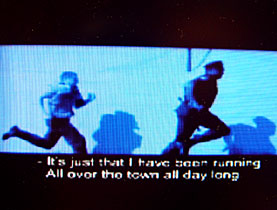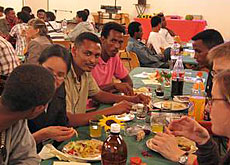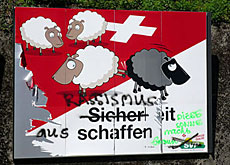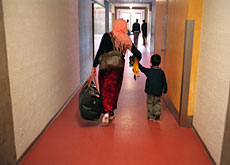Advert aims to deter African immigrants

Switzerland is funding a bleak anti-migration television campaign in Africa to discourage would-be migrants from trying to seek their fortunes in Europe.
The hard-hitting advert, which has been aired on prime-time television in Cameroon and Nigeria, depicts the life of freshly arrived migrants in Europe as one fraught with problems and dangers.
In the film an African migrant phones his father from somewhere in Europe in the pouring rain and assures him that all is well while in reality he is living on the street, being chased by the police and having to beg for a living.
“Don’t believe everything you hear. Leaving is not always living,” is the final message of the film, which the SonntagsBlick newspaper said was broadcast on Nigerian state television at half-time during a friendly football match between Switzerland and Nigeria last week.
The advert is part of a television, radio and poster campaign by the Geneva-based International Organisation for Migration (IOM), funded by Switzerland and the European Commission.
“We have the duty to show these people what the consequences of fleeing their country might be for them,” Eduard Gnesa, head of the Federal Migration Office, told the SonntagsBlick.
“Refugees should not have any false illusions about Switzerland. We have no work for these people,” he added.
In most cases immigrants from Cameroon and Nigeria can no longer claim they have been politically persecuted and therefore normally do not receive asylum status in Switzerland.
Not a paradise
IOM spokesman Jean-Philippe Chauzy said the aim of the campaign was to “inform would-be migrants of the dangers of using smuggling networks and the realities of life as an undocumented migrant in Europe”.
The IOM has produced similar adverts in Senegal and Niger, funded by Spain and the European Union, Chauzy confirmed.
Swiss Justice Minister Christoph Blocher, whose ministry controls the Migration Office, said he supported the adverts.
“We must show Africans that Switzerland is not a paradise,” he said.
Blocher’s rightwing Swiss People’s Party emerged as the biggest winner in the October parliamentary elections on the back of an anti-immigration campaign.
The short film is part of an awareness campaign that the Migration Office launched in early 2006 in Nigeria and Cameroon to dissuade economic migrants from trying their luck in Europe. It is considering a similar campaign in the Democratic Republic of the Congo and other African nations.
Too simplistic
But Pape Ndiaye Diouf, a professor at Geneva’s Institute of Development Studies, felt the campaign gave a “too simplistic response to a very complex problem”.
He said more rigorous and responsible solutions were needed to tackle the issue than simply saying: “Don’t come as there’s no work”.
“It’s important to correctly inform people in those countries about what the situation is like [in Europe] but it should go much further. It has to be accompanied with development and job creation opportunities on the spot so young people have alternatives and don’t think they absolutely have to go abroad,” he told swissinfo.
“The adverts are basically well intended,” noted Jürg Krummenacher, director of Caritas Switzerland. “But people in Nigeria or Cameroon can constantly see on TV what it looks like in Europe. I don’t think the advert offers very much.”
So far this year only 105 people from Cameroon and 246 from Nigeria have requested asylum status in Switzerland.
“Hundreds of thousands of people from both countries dream about it but only a small number actually flee,” he added.
swissinfo, Simon Bradley with agencies
The number of asylum seekers in Switzerland reached an all-time high in 1999 with 48,000 applications. 30,100 from Serbia and Kosovo.
In 2004, when government assistance to asylum seekers was stopped, the number fell to 14,250 or nearly 7,000 fewer than the previous year.
In 2006 10,500 people sought asylum in Switzerland and 19.5% were accepted.
So far this year the greatest number of asylum applications has been submitted by Eritreans (Jan-Oct: 1,324).
The anti-migration television advert is part of a campaign by the International Organisation for Migration (IOM), funded by the Swiss Federal Office of Migration and the European Commission.
Switzerland contributed $150,000 (SFr168,000) to the campaign, which also included flyers and other forms of advertising, while the European Commission has given $5,000.
The Federal Migration Office launched an anti-migration awareness campaign in Nigeria and Cameroon in early 2006. It has since been joined by the European Union.
The Swiss foreign ministry recently established two migration attachés in Abuja, Nigeria, and Dakar, Senegal, to raise awareness among Africans about the negative effects of illegal immigration.
The foreign population of Switzerland in 2006 was 1,523,586 people. This represents 20.4% of the total population.
There are believed to be around 130,000 illegal immigrants in Switzerland.
Last year Swiss voters approved a law limiting immigration for citizens outside the EU and the European Free Trade Association (Efta) to highly skilled labour.
It also aims to encourage integration, in particular by language courses, while cracking down on human trafficking and marriages of convenience. Foreigners have to make efforts towards integration, according to the spirit of the law.
Regulations were also tightened under the amended asylum law in 2006. It allows those awaiting deportation to be detained for longer periods, cuts social welfare payments to rejected asylum seekers and excludes from asylum procedures people arriving without identity papers.

In compliance with the JTI standards
More: SWI swissinfo.ch certified by the Journalism Trust Initiative











You can find an overview of ongoing debates with our journalists here . Please join us!
If you want to start a conversation about a topic raised in this article or want to report factual errors, email us at english@swissinfo.ch.